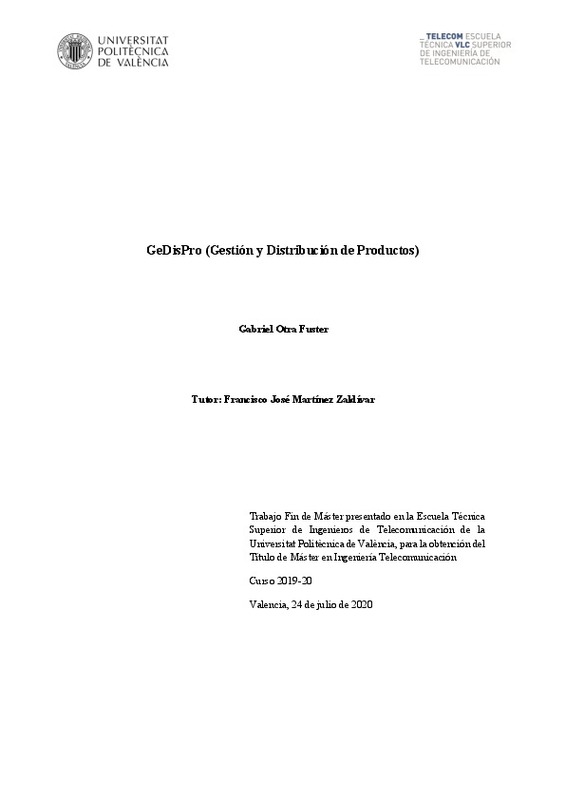JavaScript is disabled for your browser. Some features of this site may not work without it.
Buscar en RiuNet
Listar
Mi cuenta
Estadísticas
Ayuda RiuNet
Admin. UPV
Gestión y Distribución de Productos (GeDisPro)
Mostrar el registro sencillo del ítem
Ficheros en el ítem
| dc.contributor.advisor | Martínez Zaldívar, Francisco José
|
es_ES |
| dc.contributor.author | Oltra Fuster, Gabriel
|
es_ES |
| dc.date.accessioned | 2020-10-19T15:28:05Z | |
| dc.date.available | 2020-10-19T15:28:05Z | |
| dc.date.created | 2020-09-23 | es_ES |
| dc.date.issued | 2020-10-19 | es_ES |
| dc.identifier.uri | http://hdl.handle.net/10251/152372 | |
| dc.description.abstract | [ES] En estos últimos años y debido a una gran evolución tecnológica, se ha percibido un gran aumento en la creación de aplicaciones móviles. El desarrollo de estas aplicaciones cada vez se ve más dificultado debido a la gran cantidad de sistemas operativos y dispositivos que existen, cada cual ligado a un desarrollo en concreto. Debido a esto, siempre ha sido importante seleccionar la plataforma (sistema operativo y dispositivo) para la que desarrollar la aplicación. Sin embargo, el acto de tener que seleccionar solamente un sistema operativo para crear la aplicación es un inconveniente, ya que solamente se centra en una gama concreta y no puede abarcar una gran cantidad de mercado, teniendo así que ser desarrollada varias veces para poder cubrir la totalidad del mismo. En la actualidad, existen varios frameworks que permiten desarrollar una aplicación y distribuirla en diferentes plataformas. Estos frameworks tienen la gran ventaja de poder ejecutar la aplicación independientemente del sistema operativo y del dispositivo utilizando un único código. Este proyecto se centra en la creación de una aplicación que permite la gestión y distribución de productos para una empresa que proporciona productos químicos y de limpieza a hoteles. El enfoque para el desarrollo de la aplicación contempla que pueda ser utilizada tanto en el lado del cliente como por la empresa propietaria. La aplicación constará de tres niveles de autenticación para cada tipo de usuario que permitirán: gestionar productos de almacén y pedidos de los clientes (administración), tener un seguimiento y una ayuda para realizar los repartos de los pedidos a los clientes (repartidores), facilitar la realización de los pedidos semanales o mensuales (clientes). | es_ES |
| dc.description.abstract | [EN] In recent years and due to a great technological evolution, a great increase in the creation of mobile applications has been perceived. The development of these applications is increasingly difficult due to the large number of operating systems and devices that exist, each one linked to a specific development. Because of this, it has always been important to select the platform (operating system and device) for which to develop the application. However, the act of having to select only one operating system to create the application is a disadvantage, since it only focuses on a specific range and cannot cover a large amount of the market, thus having to be developed several times in order to cover the entire market. Nowadays, there are several frameworks that allow the development of an application and its distribution in different platforms. These frameworks have the great advantage of being able to run the application independently of the operating system and the device using a single code. This project focuses on the creation of an application that allows the management and distribution of products for a company that provides chemical and cleaning products to hotels. The approach for the development of the application contemplates that it can be used both on the client side and by the owner company. The application will have three levels of authentication for each type of user that will allow: to manage warehouse products and customer orders (administration), to have a follow up and help to make the deliveries of the orders to the customers (distributors), to facilitate the weekly or monthly orders (customers). | en_EN |
| dc.format.extent | 35 | es_ES |
| dc.language | Español | es_ES |
| dc.publisher | Universitat Politècnica de València | es_ES |
| dc.rights | Reconocimiento - No comercial (by-nc) | es_ES |
| dc.subject | APP híbrida | es_ES |
| dc.subject | Android | es_ES |
| dc.subject | Node JS | es_ES |
| dc.subject | TypeScript | es_ES |
| dc.subject | Plugins | es_ES |
| dc.subject | App móvil | es_ES |
| dc.subject | IOS | es_ES |
| dc.subject | Electron | es_ES |
| dc.subject | Html | es_ES |
| dc.subject | Multiplataforma | es_ES |
| dc.subject | Sqlite | es_ES |
| dc.subject | CSS | es_ES |
| dc.subject | Apache Cordova | es_ES |
| dc.subject | JavaScript | es_ES |
| dc.subject | Hybrid APP | en_EN |
| dc.subject | Multiplataform | en_EN |
| dc.subject.classification | INGENIERIA TELEMATICA | es_ES |
| dc.subject.other | Máster Universitario en Ingeniería de Telecomunicación-Màster Universitari en Enginyeria de Telecomunicació | es_ES |
| dc.title | Gestión y Distribución de Productos (GeDisPro) | es_ES |
| dc.type | Tesis de máster | es_ES |
| dc.rights.accessRights | Abierto | es_ES |
| dc.contributor.affiliation | Universitat Politècnica de València. Departamento de Comunicaciones - Departament de Comunicacions | es_ES |
| dc.contributor.affiliation | Universitat Politècnica de València. Escuela Técnica Superior de Ingenieros de Telecomunicación - Escola Tècnica Superior d'Enginyers de Telecomunicació | es_ES |
| dc.description.bibliographicCitation | Oltra Fuster, G. (2020). Gestión y Distribución de Productos (GeDisPro). http://hdl.handle.net/10251/152372 | es_ES |
| dc.description.accrualMethod | TFGM | es_ES |
| dc.relation.pasarela | TFGM\124207 | es_ES |
Este ítem aparece en la(s) siguiente(s) colección(ones)
-
ETSIT - Trabajos académicos [2408]
Escuela Técnica Superior de Ingenieros de Telecomunicación






